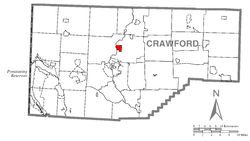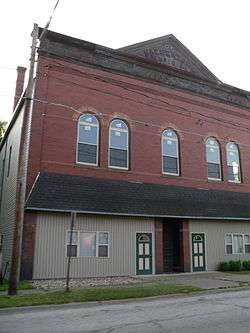Saegertown, Pennsylvania
| Saegertown, Pennsylvania | |
|---|---|
| Borough | |
|
A street in Saegertown | |
 Location of Saegertown in Crawford County | |
 Saegertown Location of Saegertown in Pennsylvania | |
| Coordinates: 41°43′10″N 80°8′44″W / 41.71944°N 80.14556°WCoordinates: 41°43′10″N 80°8′44″W / 41.71944°N 80.14556°W | |
| Country | United States |
| State | Pennsylvania |
| County | Crawford County |
| Founded | 1824 |
| Government | |
| • Mayor | Dave Myers[1] |
| Area | |
| • Total | 1.5 sq mi (4.0 km2) |
| • Land | 1.5 sq mi (4.0 km2) |
| • Water | 0.0 sq mi (0.0 km2) |
| Elevation | 1,115 ft (340 m) |
| Population (2010) | |
| • Total | 997 |
| • Density | 647/sq mi (249.9/km2) |
| Time zone | EST (UTC-4) |
| • Summer (DST) | EDT (UTC-5) |
| Area code(s) | 814 |
| Website |
www |
Saegertown is a borough in Crawford County, Pennsylvania, United States. The population was 997 at the 2010 census.[2] It was established in 1824.
History
"The settlement began at was is now known as Saegertown ca. 1795, when the brothers, Arthur and Patrick McGill, came to Woodcock Township. After Major Roger Alden built a sawmill in Saegertown, approximately 1800, the settlement was known for several years as Aldens Mill. In 1824, Daniel Saeger bought Alden's mill and adjacnt lands and at the age of 44, he laid out the town under its present name. Saeger, a native of Pennsylvania of German descent, left Egypt, Pa. in 1823 to find a suitable place to settle. After he arrived in Saegertown, he attracted to the area a large number of German Yeomanry from Lehigh and other eastern Pa. counties. Being active in the community, Saeger was an early member of the Lutheran Church, the owner of a sawmill and general store, and a justice of the peace. He was a member of the Pa. State Legislature." [3]
The Edward Saeger House was added to the National Register of Historic Places in 1980.[4]
Geography
Saegertown is located north of the center of Crawford County at 41°43′10″N 80°8′44″W / 41.71944°N 80.14556°W (41.719482, -80.145660).[5] It is bordered to the north, east, and south by Woodcock Township and to the west, across French Creek, by Hayfield Township.
U.S. Route 19 and 6 pass together through the center of town, leading northeast 8 miles (13 km) to Cambridge Springs and south 6 miles (10 km) to Meadville, the Crawford County seat. Pennsylvania Route 198 leads southeast 6 miles (10 km) to Blooming Valley and west 3 miles (5 km) to Exit 154 on Interstate 79. Via I-79 it is 32 miles (51 km) north to Erie and 95 miles (153 km) south to Pittsburgh.
According to the United States Census Bureau, the borough has a total area of 1.5 square miles (4.0 km2), all of it land.[2]
Demographics
| Historical population | |||
|---|---|---|---|
| Census | Pop. | %± | |
| 1860 | 352 | — | |
| 1870 | 441 | 25.3% | |
| 1880 | 678 | 53.7% | |
| 1890 | 745 | 9.9% | |
| 1900 | 607 | −18.5% | |
| 1910 | 712 | 17.3% | |
| 1920 | 659 | −7.4% | |
| 1930 | 645 | −2.1% | |
| 1940 | 753 | 16.7% | |
| 1950 | 836 | 11.0% | |
| 1960 | 1,131 | 35.3% | |
| 1970 | 1,348 | 19.2% | |
| 1980 | 942 | −30.1% | |
| 1990 | 1,066 | 13.2% | |
| 2000 | 1,071 | 0.5% | |
| 2010 | 997 | −6.9% | |
| Est. 2015 | 973 | [6] | −2.4% |
| Sources:[7][8][9] | |||
As of the census[8] of 2000, there were 1,071 people, 361 households, and 251 families residing in the borough. The population density was 743.5 people per square mile (287.2/km²). There were 378 housing units at an average density of 262.4 per square mile (101.4/km²). The racial makeup of the borough was 95.05% White, 2.52% African American, 0.37% Native American, 0.19% Asian, 0.65% from other races, and 1.21% from two or more races. Hispanic or Latino of any race were 0.65% of the population.
There were 361 households, out of which 32.7% had children under the age of 18 living with them, 56.0% were married couples living together, 10.5% had a female householder with no husband present, and 30.2% were non-families. 25.5% of all households were made up of individuals, and 13.0% had someone living alone who was 65 years of age or older. The average household size was 2.45 and the average family size was 2.94.
In the borough the population was spread out, with 20.5% under the age of 18, 11.3% from 18 to 24, 33.3% from 25 to 44, 20.7% from 45 to 64, and 14.1% who were 65 years of age or older. The median age was 36 years. For every 100 females there were 122.7 males. For every 100 females age 18 and over, there were 125.1 males.
The median income for a household in the borough was $32,500, and the median income for a family was $39,688. Males had a median income of $28,281 versus $22,500 for females. The per capita income for the borough was $16,163. About 4.0% of families and 5.7% of the population were below the poverty line, including 6.4% of those under age 18 and none of those age 65 or over.
References
| Wikimedia Commons has media related to Saegertown, Pennsylvania. |
- ↑ http://saegertownpa.com/index.php/borough-government/administration-personnel
- 1 2 "Geographic Identifiers: 2010 Census Summary File 1 (G001): Saegertown borough, Pennsylvania". U.S. Census Bureau, American Factfinder. Retrieved June 4, 2015.
- ↑ "National Register of Historic Places Inventory Nomination Form: Edward Saeger House" (PDF).
- ↑ National Park Service (2010-07-09). "National Register Information System". National Register of Historic Places. National Park Service.
- ↑ "US Gazetteer files: 2010, 2000, and 1990". United States Census Bureau. 2011-02-12. Retrieved 2011-04-23.
- ↑ "Annual Estimates of the Resident Population for Incorporated Places: April 1, 2010 to July 1, 2015". Retrieved July 2, 2016.
- ↑ "Census of Population and Housing". U.S. Census Bureau. Retrieved 11 December 2013.
- 1 2 "American FactFinder". United States Census Bureau. Retrieved 2008-01-31.
- ↑ "Incorporated Places and Minor Civil Divisions Datasets: Subcounty Resident Population Estimates: April 1, 2010 to July 1, 2012". Population Estimates. U.S. Census Bureau. Retrieved 11 December 2013.

